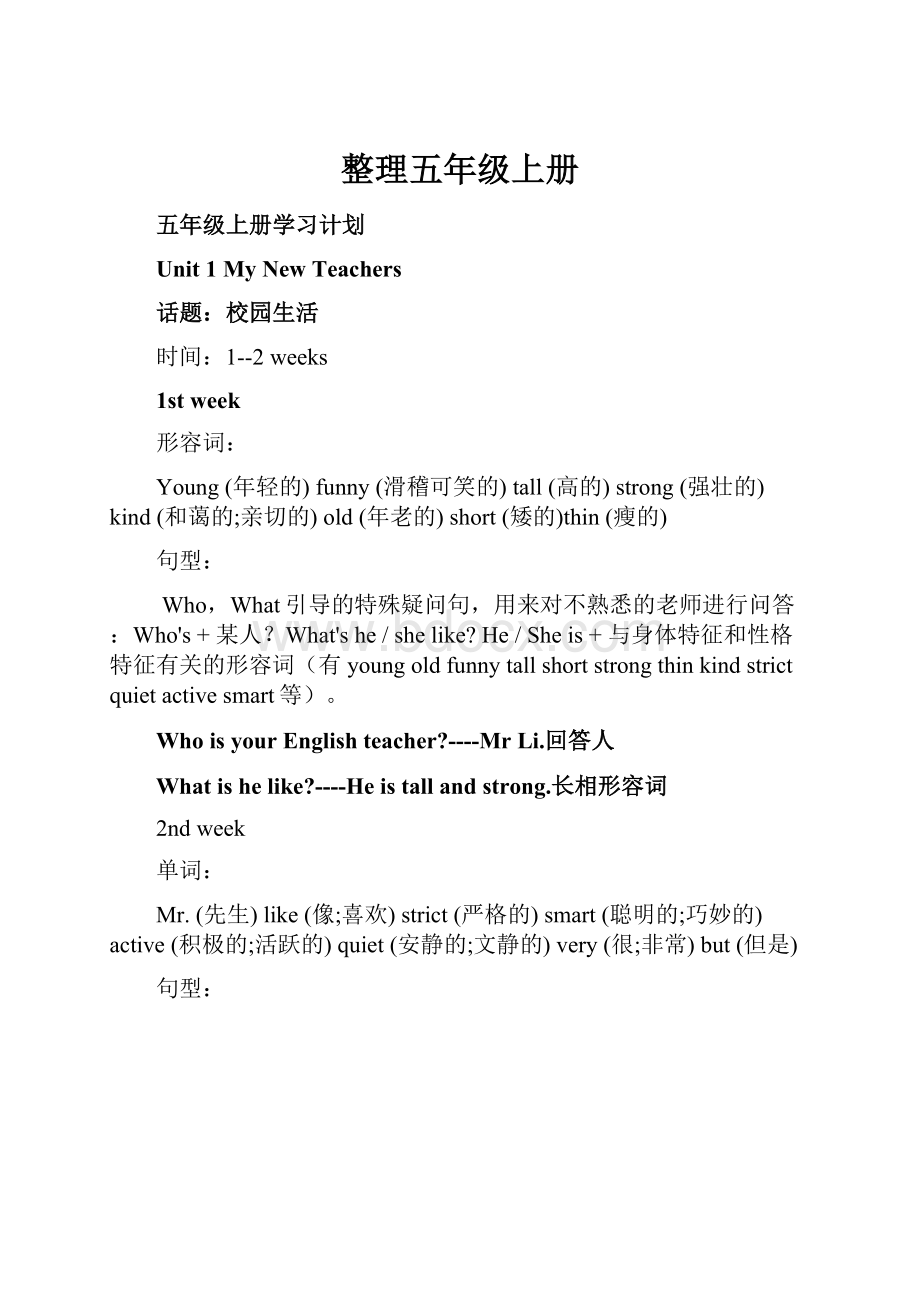整理五年级上册.docx
《整理五年级上册.docx》由会员分享,可在线阅读,更多相关《整理五年级上册.docx(8页珍藏版)》请在冰豆网上搜索。

整理五年级上册
五年级上册学习计划
Unit1MyNewTeachers
话题:
校园生活
时间:
1--2weeks
1stweek
形容词:
Young(年轻的)funny(滑稽可笑的)tall(高的)strong(强壮的)kind(和蔼的;亲切的)old(年老的)short(矮的)thin(瘦的)
句型:
Who,What引导的特殊疑问句,用来对不熟悉的老师进行问答:
Who's+某人?
What'she/shelike?
He/Sheis+与身体特征和性格特征有关的形容词(有youngoldfunnytallshortstrongthinkindstrictquietactivesmart等)。
WhoisyourEnglishteacher?
----MrLi.回答人
Whatishelike?
----Heistallandstrong.长相形容词
2ndweek
单词:
Mr.(先生)like(像;喜欢)strict(严格的)smart(聪明的;巧妙的)active(积极的;活跃的)quiet(安静的;文静的)very(很;非常)but(但是)
句型:
Is引导的一般疑问句,谈论某位老师是否具有某方面的特征:
Ishe/she+与身体特征和性格特征有关的形容词,回答用:
Yes,he/sheis.No,he/sheisn't.
Ishe\shestrict?
肯定回答:
Yes,he\sheis.否定:
No,he\sheisnot.
注意:
男女的称呼。
发音:
eaea
blbr
Unit2MyDaysoftheWeek
话题:
星期和学校、周末活动
3---4weeks
3rdweek
单词:
星期
Monday(星期一)Tuesday(星期二)Wednesday(星期三)Thursday(星期四)Friday(星期五)Saturday(星期六)Sunday(星期天)day(天;日子)
句型:
用---Whatdayisittoday?
---It's+星期几(星期要记牢MondayTuesdayWednesdayThursdayFridaySaturdaySunday),来谈论一个星期的某一天。
What引导的特殊疑问句,谈论学校课程:
Whatdoyouhaveon+星期几。
Wehave+课程。
例:
A:
WhatdoyouhaveonThursdays?
B:
WehaveEnglish,mathandscienceonThursdays.
4thweek
词组及介词:
have(有;吃)on(在…..时候)dohomework(做作业)watchTV(看电视)readbooks(读书)
句型:
What引导的特殊疑问句,围绕周末活动展开的交际:
:
WhatdoyoudoonSaturdays/Sundays?
I+行为活动+onSaturdays/Sundays.活动有:
watchTV,dohomework,readbooks等。
例:
A:
WhatdoyoudoonSaturdays?
B:
IwatchTVonSaturdays.
课本例句:
Whatdayisittoday?
--------ItisMonday.回答星期几
--WhatdoyouhaveonMondays?
有什么课
WehaveEnglishandChinese.回答课程
--WhatdoyoudoonSundays?
干什么
IoftenwatchTV.回答做的事情
发音:
owou
clcr
Unit3What'sYourFavouriteFood?
话题:
食物
5-6weeks
5thweek
食物:
eggplant(茄子)fish(鱼)greenbeans(青豆)tofu(豆腐)potato(土豆)tomato(西红柿)pork(猪肉)cabbage(卷心菜)mutton(羊肉)
其他:
for(为;给)lunch(中餐;午饭)we(我们)
句型:
1.What引导的特殊疑问句,就一日三餐进行交际:
Whatdoyouhaveforbreakfast/lunch/dinneron+星期几,回答用:
Wehave+食物(cabbageporkmuttoneggplant(变成好几个不加东西)fishgreenbeanstofupotato(es)tomato(es))。
例:
A:
WhatdoyouhaveforlunchonMondays?
B:
Wehavetomatoes,tofuandfish.
6thweek
单词:
味道:
tasty(好吃的)sweet(甜的)sour(酸的)fresh(新鲜的)salty(咸的)
其他:
favourite(最喜爱的;特别喜爱的)theyare(他们是)fruit(水果)grape(葡萄)
句型:
What引导的特殊疑问句,谈论自己最喜爱的食物,并简要说明原因(tastysweetsourfreshsalty):
What'syourfavouritefruit/food?
Ilike+食物。
例:
A:
What'syourfavouritefruit?
B:
Ilikeapples.Theyaresweet.
发音:
owoa
flfr
Recycle1
7-8weeks
Unit4WhatCanYouDo?
话题:
日常生活
9—10weeks
9thweeks
动词短语:
cookthemeals(倒垃圾)watertheflowers(浇花)sweepthefloor(扫地)cleanthebedroom(打扫卧室)emptythetrash(倒垃圾)
句型:
1.What引导的特殊疑问句,围绕学生熟悉的日常生活进行问答:
Whatcanyoudo?
Ican+家务劳动(emptythetrash.cookthemeals.watertheflowers.sweepthefloor.cleanthebedroom.makethebed.setthetable.washtheclothes.dothedishes.putawaytheclothes等)。
例:
A:
Whatcanyoudo?
B:
Icansweepthefloor.
10thweek
动词短语:
makethebed(铺床)setthetable(摆饭桌)washtheclothes(洗碗碟)dothedishes(收拾衣服)useacomputer(使用计算机)putawaytheclothes(收拾衣服)
句型:
Can引导的一般疑问句,就同伴会不会干某项家务进行交际:
Canyou+家务劳动?
Yes,Ican./No,Ican't.例:
A:
Canyoumakethebed?
B:
No,Ican't.
发音:
orall
plpr
Unit5MyNewRoom
话题:
家,住宅
11—12weeks
11thweek
单词:
家具:
curtain(空调)trashbin(垃圾箱)closet(壁橱)mirror(镜子)endtable(床头柜)
房间:
bedroom(卧室)kitchen(厨房)bathroom(卫生间)livingroom(客厅)
句型:
Therebe句型,某地有某物:
Thereis/are+家具。
Thereis+一个东西
Thereare+两个或两个以上
例:
Therearetwobedrooms,akitchen,abathroomandalivingroom.
12thweek
方位介词:
in(在…里面)on(在…上面)under(在…下面)near(在..旁边)behind(在…后边)infrontof(在…前面)over(在…上面悬空)
clothes(衣服)
句型:
用方位词准确描述家具的相对位置:
Whereis/are+家具?
It's/Theyare+方位词+相对物。
例:
A:
Whereisthetrashbin?
B:
It'snearthetable.
用方位介词描述自己的房间
发音:
irur
thth
Unit6InaNaturePark
话题:
自然景物
13-14weeks
13thweek
单词:
自然景物:
river(河流)flower(花)grass(草)lake(湖泊)forest(森林)path(路)
sky(天空)cloud(云)mountain(山脉)
句型:
Therebe句型的一般疑问句:
(把is放在there的前边)Isthere+某物+某地?
---Yes,thereis.No,thereisn't.
例1:
A:
Isthereaforestinthepark?
B:
肯定回答:
Yes,thereis.否定:
No,thereisn’t.
例2:
A:
Arethereanypandasinthemountains?
B:
肯定回答:
Yes,thereare.否定:
No,therearen’t.
14thweek
人文景观:
park(公园))house(房子)bridge(桥)road(公路)building(建筑物)clean(干净的)village(村庄)city(城镇)
其他:
picture(照片)tree(树)
句型:
Therebe句型的一般疑问句:
(把is或are放在there的前边)Is/Arethere+某物+某地?
---Yes,thereis/are.No,thereisn't/aren't.
例1:
A:
Isthereaforestinthepark?
B:
肯定回答:
Yes,thereis.否定:
No,thereisn’t.
例2:
A:
Arethereanypandasinthemountains?
B:
肯定回答:
Yes,thereare.否定:
No,therearen’t.
发音:
eror
whwh
Recycle2
15-16weeks